Nursing Palliative Care Essay
VerifiedAdded on 2020/02/24
|5
|879
|138
Essay
AI Summary
This essay addresses a case study involving Amy, a patient with a life-limiting illness and limited English proficiency. The essay explores the ethical dilemma of disclosing her diagnosis, considering the family's wish to withhold the truth. It emphasizes the importance of culturally sensitive communication and the integration of cultural practices into end-of-life care. The author highlights the need for healthcare professionals to understand the patient's beliefs, values, and preferences to provide effective and compassionate care. The essay also discusses the impact of withholding information on both the patient and her family's psychological well-being. Finally, it emphasizes the role of empathetic relationships and culturally competent communication in addressing anxiety and disagreements during end-of-life care.
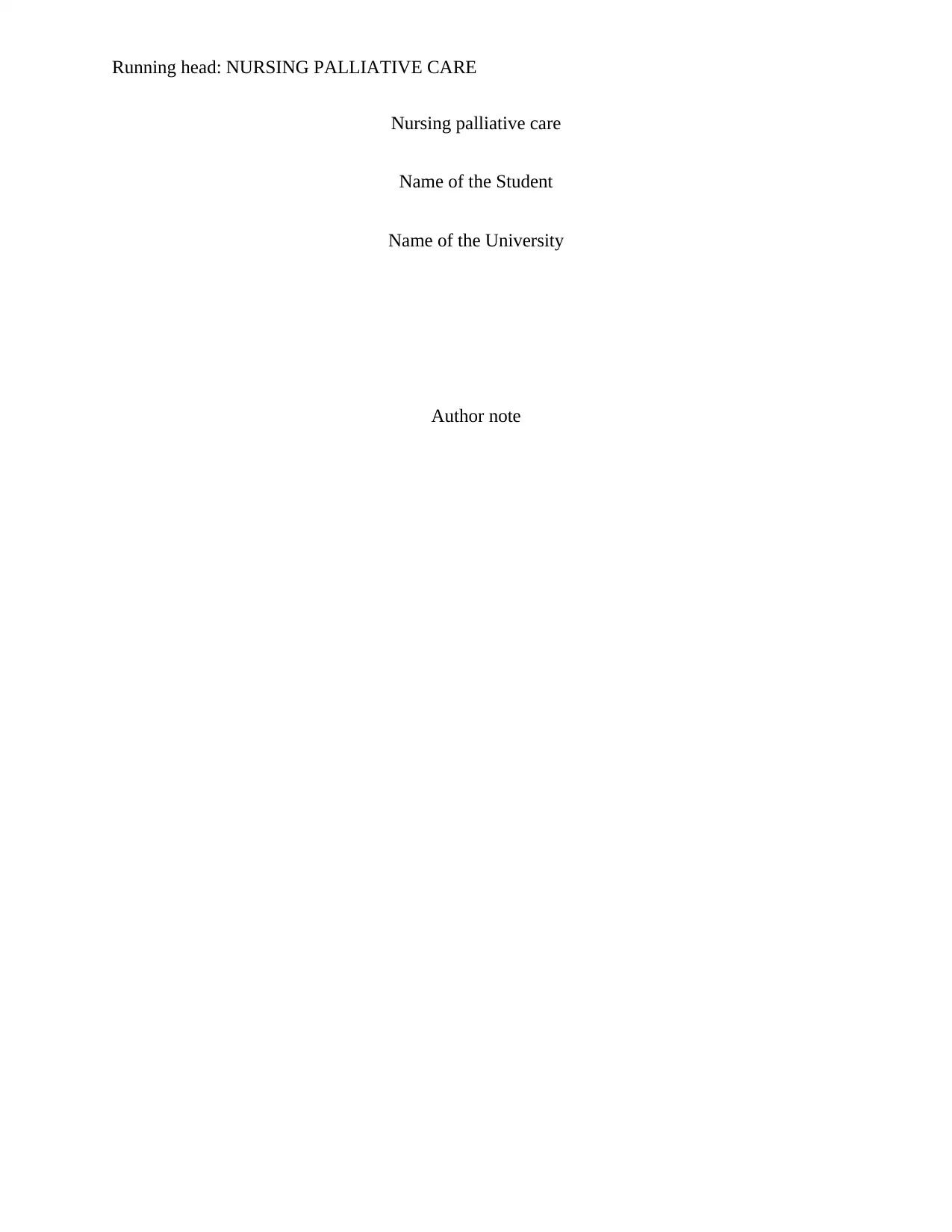
Running head: NURSING PALLIATIVE CARE
Nursing palliative care
Name of the Student
Name of the University
Author note
Nursing palliative care
Name of the Student
Name of the University
Author note
Paraphrase This Document
Need a fresh take? Get an instant paraphrase of this document with our AI Paraphraser
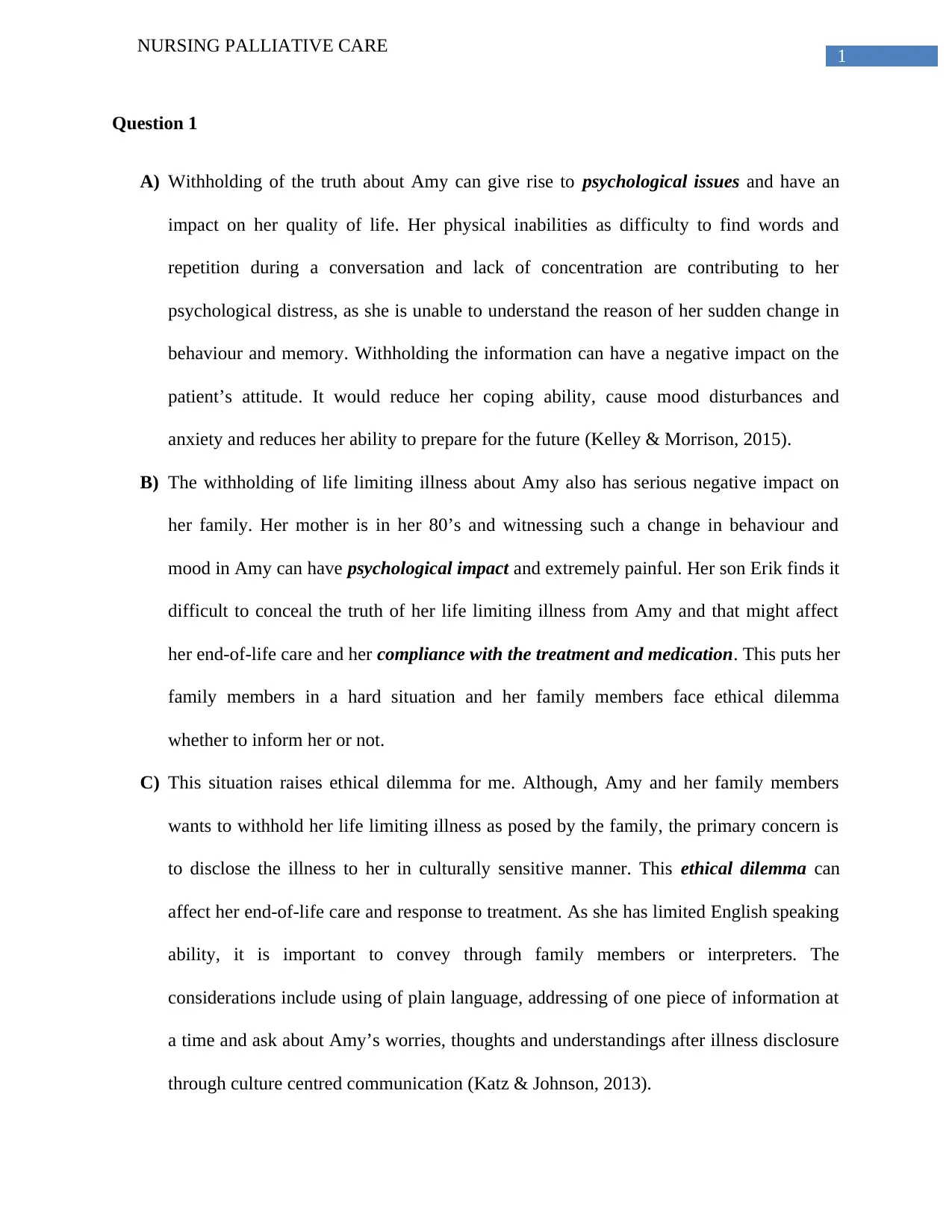
1
NURSING PALLIATIVE CARE
Question 1
A) Withholding of the truth about Amy can give rise to psychological issues and have an
impact on her quality of life. Her physical inabilities as difficulty to find words and
repetition during a conversation and lack of concentration are contributing to her
psychological distress, as she is unable to understand the reason of her sudden change in
behaviour and memory. Withholding the information can have a negative impact on the
patient’s attitude. It would reduce her coping ability, cause mood disturbances and
anxiety and reduces her ability to prepare for the future (Kelley & Morrison, 2015).
B) The withholding of life limiting illness about Amy also has serious negative impact on
her family. Her mother is in her 80’s and witnessing such a change in behaviour and
mood in Amy can have psychological impact and extremely painful. Her son Erik finds it
difficult to conceal the truth of her life limiting illness from Amy and that might affect
her end-of-life care and her compliance with the treatment and medication. This puts her
family members in a hard situation and her family members face ethical dilemma
whether to inform her or not.
C) This situation raises ethical dilemma for me. Although, Amy and her family members
wants to withhold her life limiting illness as posed by the family, the primary concern is
to disclose the illness to her in culturally sensitive manner. This ethical dilemma can
affect her end-of-life care and response to treatment. As she has limited English speaking
ability, it is important to convey through family members or interpreters. The
considerations include using of plain language, addressing of one piece of information at
a time and ask about Amy’s worries, thoughts and understandings after illness disclosure
through culture centred communication (Katz & Johnson, 2013).
NURSING PALLIATIVE CARE
Question 1
A) Withholding of the truth about Amy can give rise to psychological issues and have an
impact on her quality of life. Her physical inabilities as difficulty to find words and
repetition during a conversation and lack of concentration are contributing to her
psychological distress, as she is unable to understand the reason of her sudden change in
behaviour and memory. Withholding the information can have a negative impact on the
patient’s attitude. It would reduce her coping ability, cause mood disturbances and
anxiety and reduces her ability to prepare for the future (Kelley & Morrison, 2015).
B) The withholding of life limiting illness about Amy also has serious negative impact on
her family. Her mother is in her 80’s and witnessing such a change in behaviour and
mood in Amy can have psychological impact and extremely painful. Her son Erik finds it
difficult to conceal the truth of her life limiting illness from Amy and that might affect
her end-of-life care and her compliance with the treatment and medication. This puts her
family members in a hard situation and her family members face ethical dilemma
whether to inform her or not.
C) This situation raises ethical dilemma for me. Although, Amy and her family members
wants to withhold her life limiting illness as posed by the family, the primary concern is
to disclose the illness to her in culturally sensitive manner. This ethical dilemma can
affect her end-of-life care and response to treatment. As she has limited English speaking
ability, it is important to convey through family members or interpreters. The
considerations include using of plain language, addressing of one piece of information at
a time and ask about Amy’s worries, thoughts and understandings after illness disclosure
through culture centred communication (Katz & Johnson, 2013).
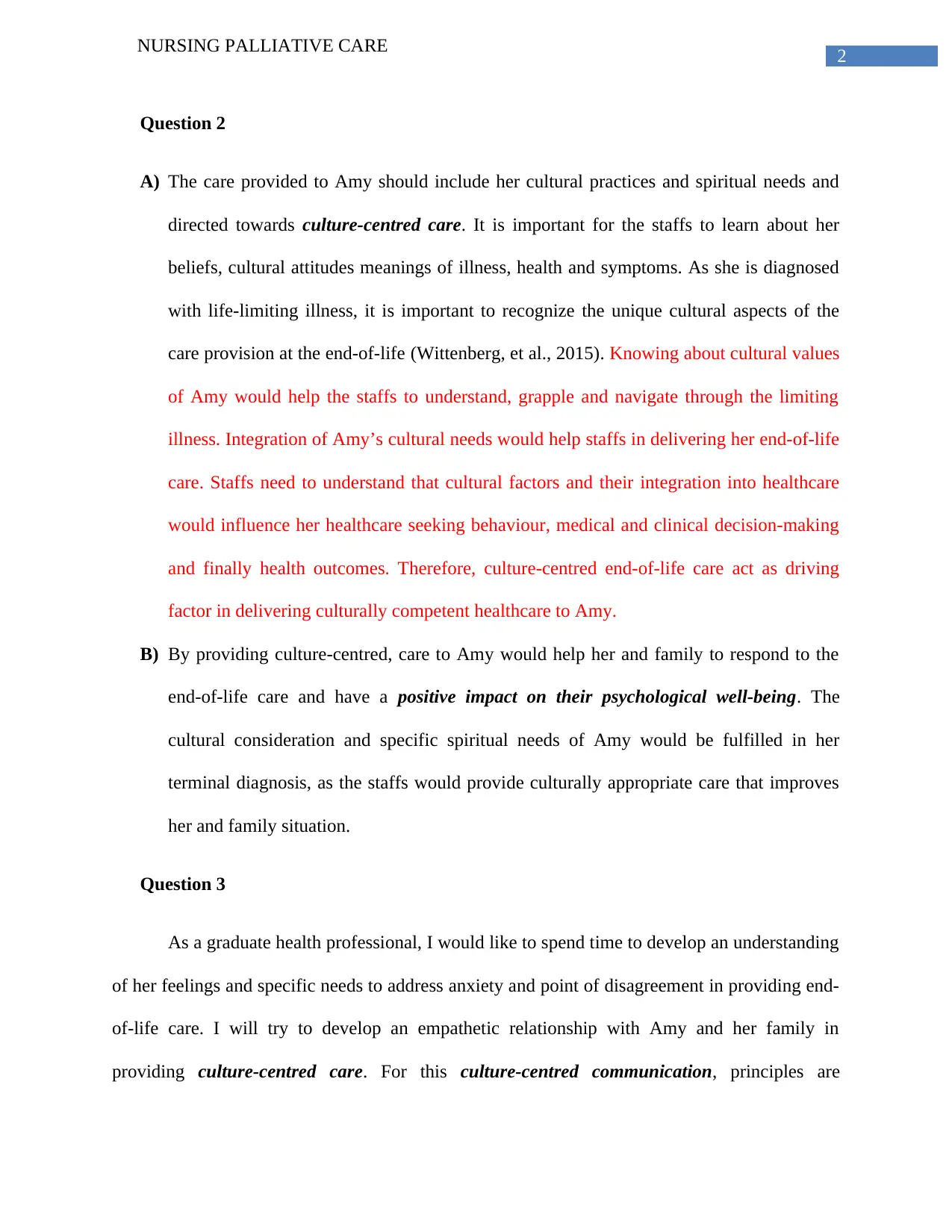
2
NURSING PALLIATIVE CARE
Question 2
A) The care provided to Amy should include her cultural practices and spiritual needs and
directed towards culture-centred care. It is important for the staffs to learn about her
beliefs, cultural attitudes meanings of illness, health and symptoms. As she is diagnosed
with life-limiting illness, it is important to recognize the unique cultural aspects of the
care provision at the end-of-life (Wittenberg, et al., 2015). Knowing about cultural values
of Amy would help the staffs to understand, grapple and navigate through the limiting
illness. Integration of Amy’s cultural needs would help staffs in delivering her end-of-life
care. Staffs need to understand that cultural factors and their integration into healthcare
would influence her healthcare seeking behaviour, medical and clinical decision-making
and finally health outcomes. Therefore, culture-centred end-of-life care act as driving
factor in delivering culturally competent healthcare to Amy.
B) By providing culture-centred, care to Amy would help her and family to respond to the
end-of-life care and have a positive impact on their psychological well-being. The
cultural consideration and specific spiritual needs of Amy would be fulfilled in her
terminal diagnosis, as the staffs would provide culturally appropriate care that improves
her and family situation.
Question 3
As a graduate health professional, I would like to spend time to develop an understanding
of her feelings and specific needs to address anxiety and point of disagreement in providing end-
of-life care. I will try to develop an empathetic relationship with Amy and her family in
providing culture-centred care. For this culture-centred communication, principles are
NURSING PALLIATIVE CARE
Question 2
A) The care provided to Amy should include her cultural practices and spiritual needs and
directed towards culture-centred care. It is important for the staffs to learn about her
beliefs, cultural attitudes meanings of illness, health and symptoms. As she is diagnosed
with life-limiting illness, it is important to recognize the unique cultural aspects of the
care provision at the end-of-life (Wittenberg, et al., 2015). Knowing about cultural values
of Amy would help the staffs to understand, grapple and navigate through the limiting
illness. Integration of Amy’s cultural needs would help staffs in delivering her end-of-life
care. Staffs need to understand that cultural factors and their integration into healthcare
would influence her healthcare seeking behaviour, medical and clinical decision-making
and finally health outcomes. Therefore, culture-centred end-of-life care act as driving
factor in delivering culturally competent healthcare to Amy.
B) By providing culture-centred, care to Amy would help her and family to respond to the
end-of-life care and have a positive impact on their psychological well-being. The
cultural consideration and specific spiritual needs of Amy would be fulfilled in her
terminal diagnosis, as the staffs would provide culturally appropriate care that improves
her and family situation.
Question 3
As a graduate health professional, I would like to spend time to develop an understanding
of her feelings and specific needs to address anxiety and point of disagreement in providing end-
of-life care. I will try to develop an empathetic relationship with Amy and her family in
providing culture-centred care. For this culture-centred communication, principles are
⊘ This is a preview!⊘
Do you want full access?
Subscribe today to unlock all pages.

Trusted by 1+ million students worldwide
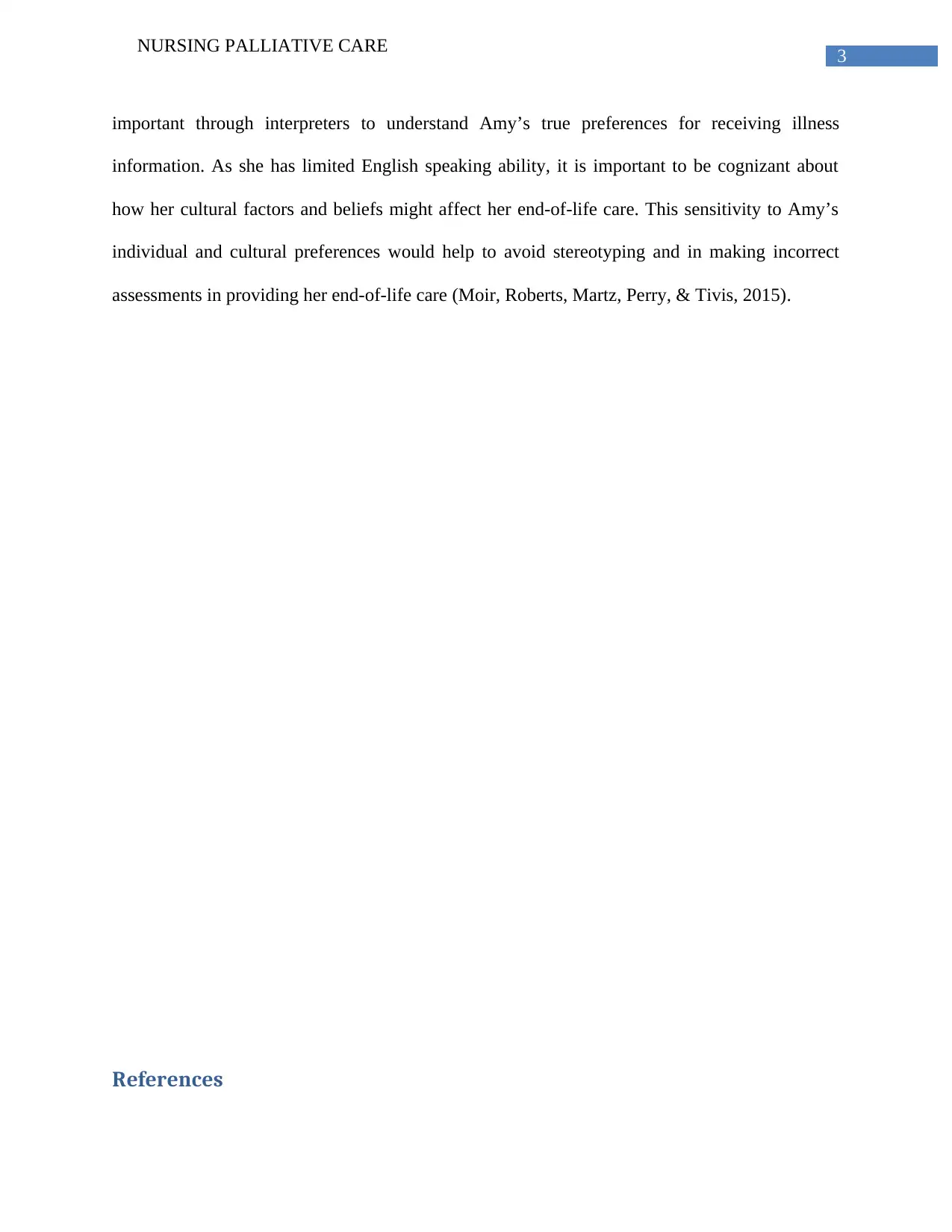
3
NURSING PALLIATIVE CARE
important through interpreters to understand Amy’s true preferences for receiving illness
information. As she has limited English speaking ability, it is important to be cognizant about
how her cultural factors and beliefs might affect her end-of-life care. This sensitivity to Amy’s
individual and cultural preferences would help to avoid stereotyping and in making incorrect
assessments in providing her end-of-life care (Moir, Roberts, Martz, Perry, & Tivis, 2015).
References
NURSING PALLIATIVE CARE
important through interpreters to understand Amy’s true preferences for receiving illness
information. As she has limited English speaking ability, it is important to be cognizant about
how her cultural factors and beliefs might affect her end-of-life care. This sensitivity to Amy’s
individual and cultural preferences would help to avoid stereotyping and in making incorrect
assessments in providing her end-of-life care (Moir, Roberts, Martz, Perry, & Tivis, 2015).
References
Paraphrase This Document
Need a fresh take? Get an instant paraphrase of this document with our AI Paraphraser
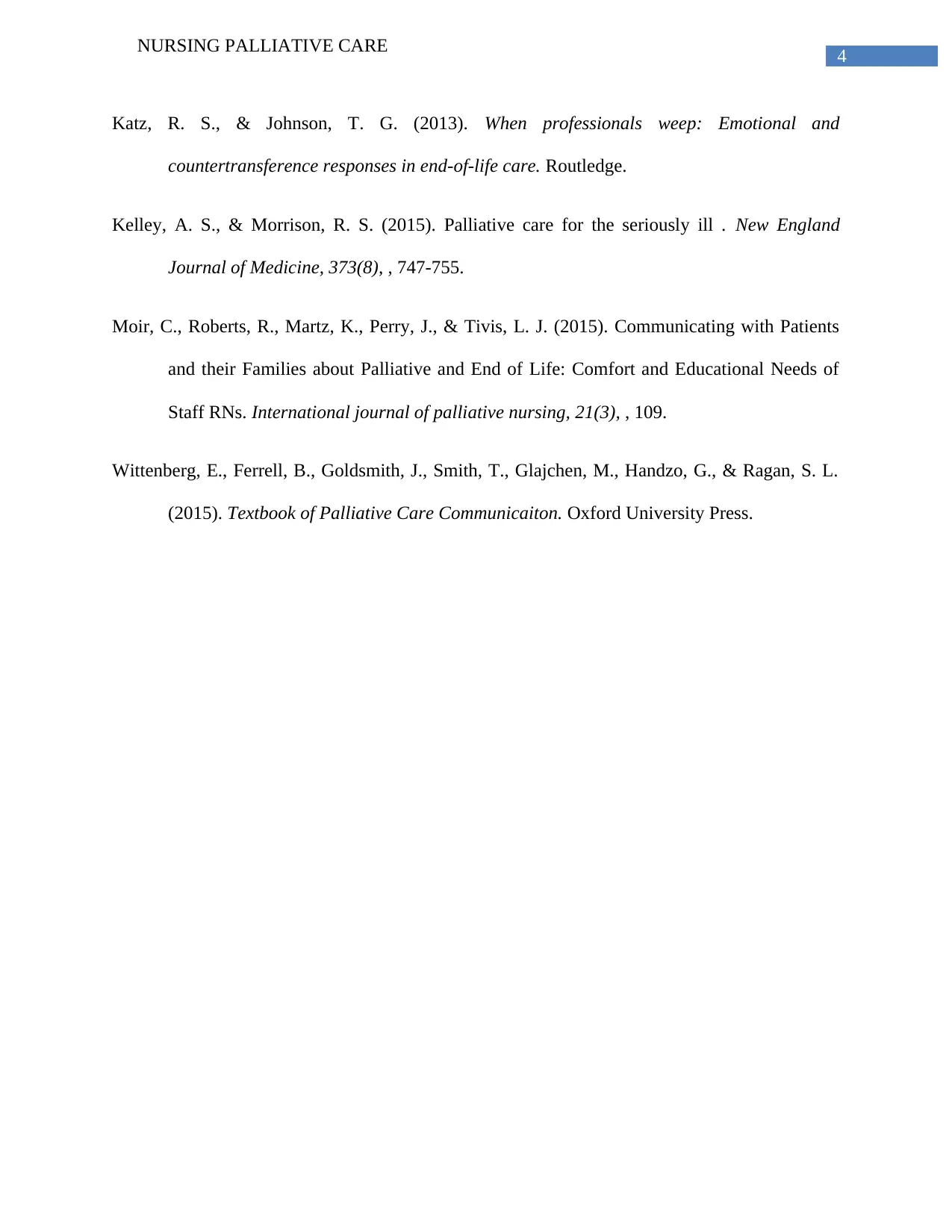
4
NURSING PALLIATIVE CARE
Katz, R. S., & Johnson, T. G. (2013). When professionals weep: Emotional and
countertransference responses in end-of-life care. Routledge.
Kelley, A. S., & Morrison, R. S. (2015). Palliative care for the seriously ill . New England
Journal of Medicine, 373(8), , 747-755.
Moir, C., Roberts, R., Martz, K., Perry, J., & Tivis, L. J. (2015). Communicating with Patients
and their Families about Palliative and End of Life: Comfort and Educational Needs of
Staff RNs. International journal of palliative nursing, 21(3), , 109.
Wittenberg, E., Ferrell, B., Goldsmith, J., Smith, T., Glajchen, M., Handzo, G., & Ragan, S. L.
(2015). Textbook of Palliative Care Communicaiton. Oxford University Press.
NURSING PALLIATIVE CARE
Katz, R. S., & Johnson, T. G. (2013). When professionals weep: Emotional and
countertransference responses in end-of-life care. Routledge.
Kelley, A. S., & Morrison, R. S. (2015). Palliative care for the seriously ill . New England
Journal of Medicine, 373(8), , 747-755.
Moir, C., Roberts, R., Martz, K., Perry, J., & Tivis, L. J. (2015). Communicating with Patients
and their Families about Palliative and End of Life: Comfort and Educational Needs of
Staff RNs. International journal of palliative nursing, 21(3), , 109.
Wittenberg, E., Ferrell, B., Goldsmith, J., Smith, T., Glajchen, M., Handzo, G., & Ragan, S. L.
(2015). Textbook of Palliative Care Communicaiton. Oxford University Press.
1 out of 5
Related Documents
Your All-in-One AI-Powered Toolkit for Academic Success.
+13062052269
info@desklib.com
Available 24*7 on WhatsApp / Email
![[object Object]](/_next/static/media/star-bottom.7253800d.svg)
Unlock your academic potential
Copyright © 2020–2026 A2Z Services. All Rights Reserved. Developed and managed by ZUCOL.





